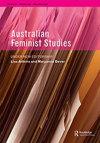五欲五求
IF 1.5
4区 社会学
Q2 WOMENS STUDIES
引用次数: 8
摘要
我们认为,女性主义研究特别适合分析“我们人类”在面对地球灾难时想要什么的悖论。这期特刊中的文章唤起了资本主义对消费的迫切需求、激进分子对抵抗的呼吁,以及酷儿女权主义者对性和渴望的描绘之间的紧张关系。反过来问我们作为编辑想从女权主义环境人文项目中得到什么,我们的回答是:(1)我们想从环境危机中激发欲望和需求之间的新关系;(2)我们想要一个过分女权主义的环境人文学科;(3)我们想要解决“女权主义”和“环境”之间困难而又必要的关系;(4)我们希望环境人文学科有多重的、定位的、规模反常的、历史上尴尬的谱系;(5)我们希望“肩负起改造世界的重任”。我们通过一系列例子将这些要求置于背景中:我们正在写作的地方目前正在遭受干旱和森林大火的困扰;贝蒂·格鲁布尔的《爱与怒》;从我们独特的视角讲述女性主义环境人文的起源故事;以及1943年澳大利亚作家玛乔丽·巴纳德的短篇小说《干旱期》。我们主张女权主义的力量,将欲望与需求对立起来。本文章由计算机程序翻译,如有差异,请以英文原文为准。
Five Desires, Five Demands
ABSTRACT We propose that feminist studies are particularly well-situated to analyse the paradox of what ‘we humans’ want as we gaze into the eyes of planetary catastrophe. The contributions in the special issue evoke tensions between a capitalist imperative to consume, activist calls for resistance, and queer feminist figurations of sex and longing. Asking in turn what we as editors want from the project of feminist environmental humanities, we respond: (1) we want to spark new relations between desire and demand from within environmental crisis; (2) we want a fulsomely feminist environmental humanities; (3) we want to inhabit the difficult and necessary articulation of ‘feminism’ and ‘environment’; (4) we want multiple, situated, perversely scaled and historically awkward genealogies for environmental humanities; and (5) we want ‘to take up the burden of remaking our world’. We contextualise these demands via a series of examples: the drought and bushfires currently gripping the places we are writing from; Betty Grumble’s performance LOVE AND ANGER; an origin story of feminist environmental humanities as told from our particular perspectives; and a 1943 short story, ‘Dry Spell’, by Australian writer Marjorie Barnard. We argue for the feminist potency of holding desire in tension with demand.
求助全文
通过发布文献求助,成功后即可免费获取论文全文。
去求助
来源期刊

Australian Feminist Studies
WOMENS STUDIES-
CiteScore
2.50
自引率
0.00%
发文量
7
期刊介绍:
Australian Feminist Studies was launched in the summer of 1985 by the Research Centre for Women"s Studies at the University of Adelaide. During the subsequent two decades it has become a leading journal of feminist studies. As an international, peer-reviewed journal, Australian Feminist Studies is proud to sustain a clear political commitment to feminist teaching, research and scholarship. The journal publishes articles of the highest calibre from all around the world, that contribute to current developments and issues across a spectrum of feminisms.
 求助内容:
求助内容: 应助结果提醒方式:
应助结果提醒方式:


